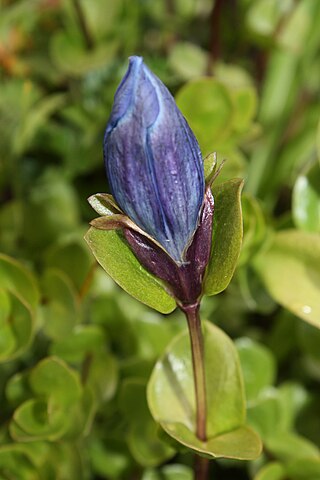
Gentiana calycosa is a species of flowering plant in the family Gentianaceae. It is a herbaceous perennial gentian known by the common names Rainier pleated gentian and mountain bog gentian.
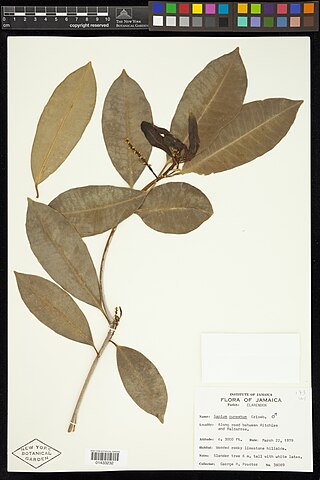
Sapium cuneatum is a species of flowering plant in the family Euphorbiaceae. It is endemic to Jamaica.

Centaurium erythraea is a species of flowering plant in the gentian family known by the common names common centaury and European centaury.

Zeltnera venusta is a species of flowering plant in the gentian family known by the common names California centaury, charming centaury and canchalagua. This centaury is native to much of California, southern Oregon, and northwest Baja California.
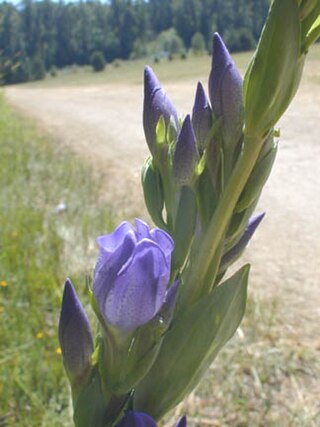
Gentiana sceptrum is a species of flowering plant in the family Gentianaceae. It is known by the common names king's scepter gentian or king's gentian.

Zeltnera muehlenbergii is a species of annual herb commonly known as Monterey centaury and Muhlenberg's centaury. It is native to western North America from British Columbia to California and Nevada, where it commonly grows in forests and other moist places. This is an annual herb growing thin, erect, branching stems to heights anywhere between 10 centimeters and one meter. Oval-shaped leaves are arranged oppositely on the stem and are up to 2 or 3 centimeters long. The branching inflorescence bears many flowers, each with small bracts at its base. The flower has five oval-shaped petallike lobes each a few millimeters long.

Salvia transsylvanica is a species of flowering plant in the family Lamiaceae. It is a herbaceous perennial native to a wide area from north and central Russia to Romania. It was described and named in 1853 by botanist Philipp Johann Ferdinand Schur, with the specific epithet referring to the Transylvanian Alps located in central Romania. It was introduced into horticulture in the 1980s.
Calliandra cruegeri is a species of flowering plants of the genus Calliandra in the family Fabaceae.
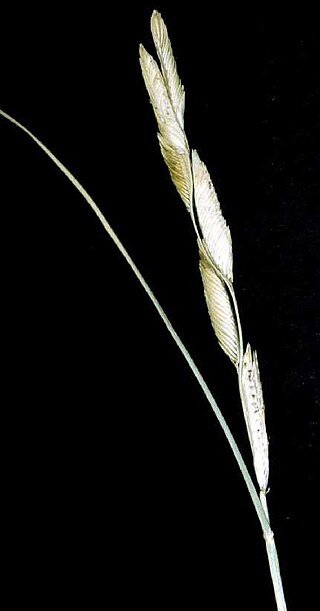
Sporobolus hookerianus is a species of grass known by the common name alkali cordgrass.
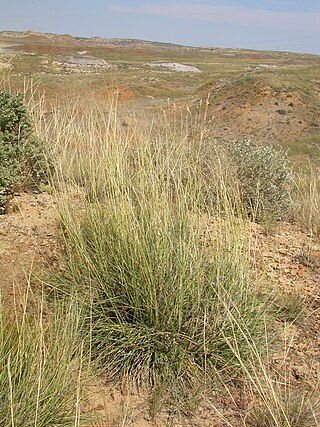
Sporobolus airoides is a species of grass known by the common name alkali sacaton. It is native to western North America, including the Western United States west of the Mississippi River, British Columbia and Alberta in Canada, and northern and central Mexico. It grows in many types of habitat, often in alkali soils, such as in California desert regions.

Zeltnera namatophila, the spring-loving centaury, is a rare species of flowering plant in the gentian family. It is endemic to the Amargosa Valley, in Nye County, southwestern Nevada.

Centaurium pulchellum is a species of flowering plant in the gentian family known by the common name lesser centaury, or slender centaury. It differs from Centaurium erythraea by lacking basal rosette of leaves and by having a developed peduncle below the flowers. It is often much smaller, less than ten centimetres. It is native to the southern temperate parts of Europe.

Gentiana olivieri is a speciesj of flowering plant in the family Gentianaceae found in Asia.

Zeltnera is a genus of flowering plants in the gentian family. It was erected in 2004 when the genus Centaurium was split. Genetic analysis revealed that Centaurium was polyphyletic, made up of plants that could be grouped into four clades. Each became a genus. Centaurium remained, but it is now limited to the Eurasian species. The Mexican species now belong to genus Gyrandra, and the Mediterranean and Australian plants are in genus Schenkia. The new name Zeltnera was given to this genus, which contains most of the North American centauries. There are about 25 species.
Pictetia mucronata is a species of flowering plant in the family Fabaceae. It is found only in Cuba.
Poitea carinalis is a species of flowering plant in the family Fabaceae. It is a small deciduous tree or dry shrub and when in flower, usually February–April, an individual Poitea (Sabinea) can be seen from a mile away as the entire tree turns brilliant red, the flowers have the typical pea form with a long keel. Scattered individuals occur throughout the dry shrub and are occasionally planted elsewhere and since it has been adopted as the national flower of Dominica, people are now encouraged to plant it more widely. The flowers appear just before the new leaves unfurl and attract an abundance of insects, hummingbirds and bananaquits, but last for only a short time. Out of flower, it has 6-8 pairs of leaflets and a flattened pod. It is endemic to Dominica.

Hemithrinax compacta is a species of flowering plant in the family Arecaceae. It is a palm that is endemic to Cuba.
Tetralix is a genus of flowering plant in the mallow family Malvaceae. It is native to Cuba. Members of the genus are adapted to serpentine soils, and are nickel hyperaccumulators.

Knautia macedonica, the Macedonian scabious, is a species of flowering plant in the family Caprifoliaceae. It is native to Southeastern Europe - Albania, Bulgaria, Greece, North Macedonia, southeastern Romania and Kırklareli in Turkey. Growing to 75 cm (30 in), this herbaceous perennial produces rich red "pincushion" flowers, similar to those of its close relative scabious (Scabiosa), on slender upright stems throughout summer.

Hoppea fastigiata is a species of herbaceous plant in the family Gentianaceae. It is a small branched herb with oppositely arranged ovate, subsessile leaves. White flowers appear in terminal or axillary cymes. Flowering and fruiting season is September-October.
















